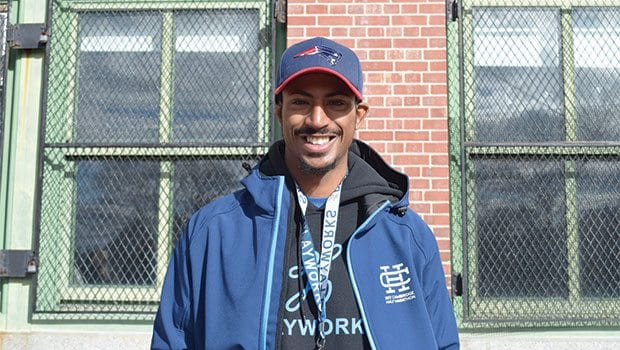
Recreational play might seem like an innate behavior in every child, but for Fidelis Teixeira, site coordinator for Playworks New England, this isn’t always the case in his line of work.
Teixeira, known among students as Coach Fidelis, is in the business of having fun. More specifically, he trains teachers, recess monitors and children on how to play, whether it be kickball, four-square or other lesser-known activities like “Mr. Fox” or “sprout ball.”
In his third year working with Playworks, he serves also as a mentor for Boston’s public school kids, aiming constantly to prove that work and play can co-exist in a way that enhances learning and health.

Fidelis Teixeira with his students at the Joyce Kilmer K-8 School.
A regional branch of a national nonprofit, Playworks New England brings play and physical activity into elementary schools in Massachusetts, Rhode Island, and New Hampshire through onsite training.
Teixeira provides training and onsite assistance in four Boston schools: Michael J. Perkins Elementary School, Boston Green Academy, Joyce Kilmer K-8 School, and Boston Renaissance Charter School.
“Play can have an incredible impact on children and schools — a trickle-down effect, if you will,” said Teixeira. “After a year of Playworks programming, kids walk down the hall differently. Kids relate to their peers and teachers differently. They communicate better. They can resolve many conflicts on their own.”
For city kids, especially ones who were born with technology right at their fingertips, guided coaching on physical play can be crucial.
“I had no recess ever, in my life,” said Teixeira, who attended the Boston Renaissance Charter School from kindergarten through seventh grade when it was previously located in a high-rise building in downtown Boston. “We didn’t have a yard for recess.”
He added, “I was never a huge athlete as a kid, until I got to high school and played sports. But if I would have had recess, it might have exposed me to being part of a team.”
Teixeira’s alma mater relocated to Hyde Park, where they now have outdoor space for recreation.
For many other city elementary and middle school kids, however, “You’d be surprised at how many of them don’t have any idea how to play a game in a group,” he said. “They’re so used to having a basketball to themselves [in street pick-up games].”
It wasn’t until 2013 that Boston Public Schools officially mandated a recess requirement of at least 20 minutes for all schools serving students in kindergarten through eighth grade.
Child development
The games Teixeira teaches are focused on developing cooperation and teamwork and touch upon different social-emotional learning skills such as communication and conflict resolution.
For example, one of Teixeira’s favorite games to play is sprout ball, which entails having to take three steps before throwing a ball at someone to get them “out.” He said, “Sprout ball is all about spatial awareness and honesty. You have to admit when you get tagged by a ball.”
Every Wednesday, all Playworks coaches are required to attend staff training. The training includes learning new games to play or learning how to work with different types of schoolchildren. “We’ve been taught how to work and play with kids who might have faced some type of trauma, which is a little different from how you normally play,” said Teixeira. For example, avoiding contact sport activities would work best with children who have experienced physical trauma.
Although each child is encouraged to participate in the recess activities, “All the games are challenge by choice,” said Teixeira.
He added, “A lot of them have never heard of these games, but if you have a little group going and they see you playing, more kids will come and join in — no matter how ridiculous they think you look.”
Caroline Barclay, Playworks New England program manager, said, “We like to stay away from the word structure. But we think of ourselves as a way to provide different choices for kids to play.”
For many schoolchildren, recess is the only time during the day when they can socialize and have an outlet for their energy. Playworks encourages onsite coordinators to connect with students in a way that wouldn’t be possible inside a classroom.
“As we’re playing games, we’re building relationships and building rapport with the students,” said Teixeira.






